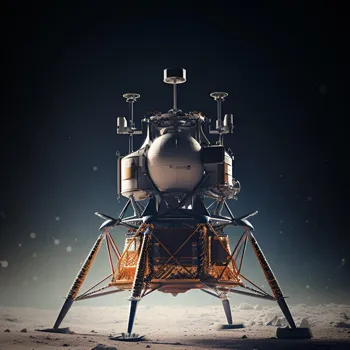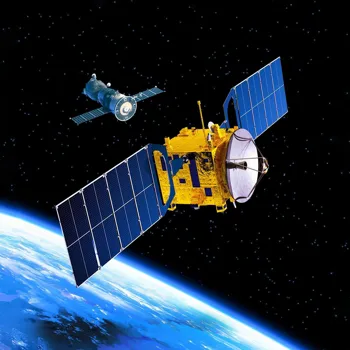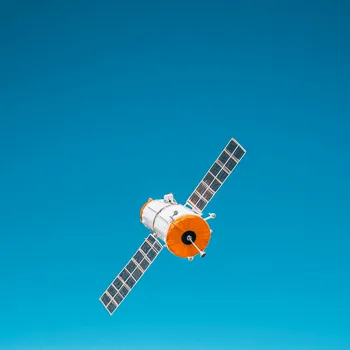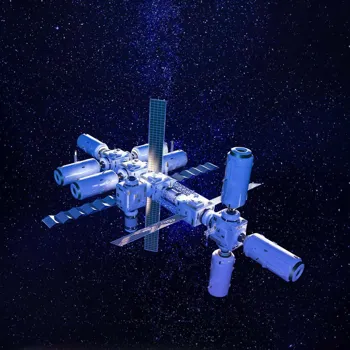AI in Space: India's Leap to the Stars! Can AI revolutionize space exploration? Dive deeper to unravel the mysteries
Chandrayaan-3's successful landing near the Moon's south pole has not only made every
Indian's chest swell with pride but it has also ignited a fresh wave of excitement about the future of space exploration. Whispers about Artificial Intelligence (AI) are growing louder in space research circles.

Can AI be our ticket to exploring further reaches of space, tackling tough challenges, and making discoveries that were once science fiction? Experts believe so, but the journey isn't without its bumps.
AI's role in space exploration: robots on Mars, analyze data, build habitats, aid discoveries
AI’s potential in space exploration is truly vast. Imagine AI-powered robots that can navigate treacherous terrains on Mars or asteroids, collect samples, and even build habitats for future human settlements. These robots wouldn’t need constant instructions from Earth.
They could analyze data, make decisions, and adapt to changing conditions autonomously. This is especially beneficial when communicating across vast distances with earth having delays, making real-time control nearly impossible.
AI Algorithms can sift through mountains of data collected by space telescopes and satellites, identifying patterns and anomalies that human scientists might miss.
This could lead to breakthroughs in our understanding of the universe, from spotting new planets to unraveling the mysteries of dark matter and dark energy.
Developing radiation-hardened AI for space, despite resource constraints
One of the biggest hurdles is developing AI systems that can withstand the harsh conditions of space. The radiation, extreme temperatures, and vacuum of space can wreak havoc on electronic components, including the processors that power AI. So, creating “radiation-hardened” AI systems is crucial.

These systems need to be incredibly reliable, as repairs in space are costly and often impossible. Another challenge is ensuring that AI systems can operate with limited resources such as power and bandwidth.
Spacecraft have limited solar power that affects which AI technology can be used, and communication bandwidth back to earth is also limited.
This means AI algorithms need to be efficient and capable of processing data onboard the spacecraft, rather than relying on sending everything back to Earth for analysis.
ISRO and Indian startups leverage AI in space exploration
The Indian Space Research Organisation (ISRO) is already exploring the potential of AI in various aspects of its space program. AI is being used to analyse satellite imagery for agriculture tracking, disaster management, and urban planning.

ISRO is also looking at AI powered autonomous navigation for future missions and data processing of satellite imagery. Indian startups are also jumping into the arena, developing AI solutions for space debris monitoring, satellite data analytics, and even in-space manufacturing.
Companies are working on AI algorithms that can predict the trajectory of space debris, helping to avoid collisions, and developing new techniques for extracting valuable resources from asteroids.
These indigenous innovations not only boost India's space capabilities but also contribute to the global efforts in space exploration.
AI enhances mission efficiency through scheduling, navigation, safety measures, and real-time decision-making
AI can vastly improve mission efficiency in many ways.
AI powered scheduling and resource allocation will allow scientists to maximize use of limited resources on missions and extend missions, and autonomous spacecraft navigation powered by AI will reduce reliance on ground control for routine tasks, leading to more efficient mission operations.
AI can also proactively enhance safety measures via anomaly detection and predictive maintenance. By analysing sensor data and identifying potential problems early on, AI can help prevent equipment failures and ensure the safety of astronauts.
It can also assist with real-time decision-making in emergency situations, such as course corrections to avoid unforeseen obstacles during landing or critical maintenance during a spacewalk.
AI in space must be rigorously tested for safety and ethics
There are also concerns to be addressed. Ensuring safety and reliability are paramount. AI systems must be rigorously tested and validated to guarantee that they perform as expected in real-world scenarios. There are chances where a small error could have catastrophic consequences for a mission.
Ethical considerations also come into play. How do we ensure that AI systems are used responsibly and do not lead to unintended consequences? Who gets to decide how AI is used in space, and what are the guidelines for AI decision-making in critical situations?
These are complex questions that require careful consideration and international cooperation.
The future of AI in space holds possibilities and challenges, urging responsible development for exciting exploration
The future of AI in space exploration is brimming with both possibilities and challenges. It does not come without great responsibilities. As AI becomes more sophisticated, it's important for scientists, engineers, and policymakers to work together.

They need to develop frameworks that ensure responsible use, addressing the ethical consideration as it is a step towards a truly exciting future for space exploration.
If we can overcome these challenges and harness the power of AI, we can unlock a new era of discovery and push the boundaries of human knowledge and ingenuity. Perhaps, one day AI will help us find a new home among the stars, giving humanity a chance to explore the cosmos.
AI Generated Content. Glance/InMobi shall have no liability for the content




















